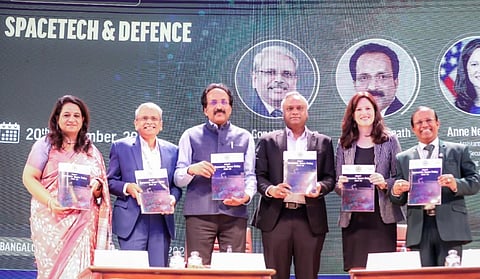

BENGALURU: The Karnataka government on Wednesday released the draft Karnataka Space Technology Policy, 2024-29 with the aim to make the state a global destination for space technology.
The policy was released at the 27th edition of the Bengaluru Tech Summit by IT-BT and Rural Development and Panchayat Raj (RDPR) Minister Priyank Kharge and Indian Space Research Organisation (ISRO) Chairman S Somanath.
The policy lays down targets to be achieved holds a 50% stake in the national market share and transforms Karnataka into a global destination for space technologies with 5% of the global market share.
Stating that Karnataka is one of the leading destinations for space technologies, the policy identified key strategic focus areas for the state government. It aims to train and up-skill 5,000 students and young professionals, including 1,500 females, employment ready for domestic and international space companies; design incentives to attract three billion USD investments into the state’s space ecosystem; encourage public-private partnership in creating testing facilities and manufacturing clusters; and support 500 startups and MSMEs to enable the launch of over 50 satellites with substantial indigenisation.
It also aims to set up dedicated manufacturing parks for space companies and testing centres across Karnataka and have dedicated initiatives to help startups and MSMEs to do research and development.
An official from the IT-BT department said to understand the vision, challenges and expectations of the entire emerging NewSpace ecosystem and the traditional space ecosystem, the Department of Electronics, Information Technology, Biotechnology, Science and Technology, had held a open- house industry consultation. Discussions with startups, MSMEs, investors, established space companies and department working with IN-SPACe and DRDO were also taken before drafting the policy.
“The state’s draft policy is on the lines of the central government’s policy. It summarises the global, national and state level overview of the sector and the expectation of the industries. The policy has been designed in such a way to help the sector and the state’s economy,” the official said.
Somanath said, “I am happy that Karnataka is bring up a space policy that will help the sector to grow and examples are also showing up very well, where start-ups are growing well in building rockets in the private sector. Some startups are coming to us and saying that they want to build big rockets and are seeking ISRO’s help in this. This is inspiring and exciting, though they realise the challenges that are before them, yet achieve success. At least five companies are building small satellites now and many people are scaling up facilities to cooperate, build and evaluate the sub- stations.”
He added that the policy will focus on all segments (upstream and downstream) of the space value chain for commercial, defense space and electronics and space research